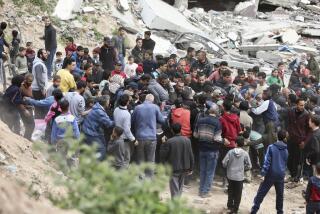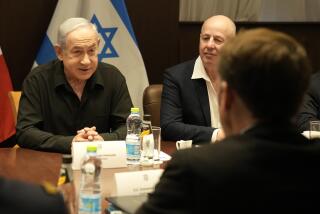Israeli Leader Minimizes Iraqi Threat : Mideast: The president, a former major general, seeks to calm public fears. He says Saddam Hussein is dangerous but he is unlikely to attack.
- Share via
JERUSALEM — President Chaim Herzog sought Friday to restore a measure of calm to Israel, declaring in a broadcast “special commentary” that Iraq “has no interest in carrying out hostile operations.”
Herzog described Iraq’s President Saddam Hussein as “a man who has erred and is trying to contain the damage.”
It was the first time Herzog had spoken out at length on the Persian Gulf crisis, which has caused much public consternation in Israel, particularly in light of repeated Iraqi threats to take military action against Israel.
His views are regarded as not just those of a political figure; he was a major general in the Israeli army and chief of military intelligence before going into politics, and he is a noted military historian.
His remarks appeared to reflect current military thinking. Military sources said Friday at a press briefing that Iraq’s Hussein seems to be “trying to buy time.”
They said Iraq does not want a military confrontation with the United States and will try to wait out the embargo.
Herzog said he realizes that “an atmosphere of an Iraqi threat against Israel has been created” and added that “it is correct that (Hussein) is dangerous and uncontrollable.”
But he said that Hussein “makes rational decisions, despite reaching mistaken conclusions, as we have seen.”
Because of the prompt intervention by President Bush and other Western leaders, Herzog said, Hussein “not only will not initiate the operation of missiles, he will not even initiate the operation of a machine gun.”
He said the decision to undertake military operations in the gulf region “is in my opinion limited solely to President Bush.”
Herzog brushed aside warnings by some Iraqi military sources that Iraq will send missiles against Israel if the United States attacks Iraq.
“It is not logical,” he said, “that Saddam Hussein would desire to launch his missiles specifically against Israel, thereby opening another front. The number of missiles at his disposal is limited, and from the moment of being launched, the missiles turn the launching bases into targets, not only for the Israeli air force but for the entire force deployed against him.
“Moreover, to the best of my knowledge, these missiles have not been tested at such long range. It is unclear whether they are equipped with chemical warheads. Until now, the Iraqis have used chemical weapons through bombs or artillery.”
The military officers made this same point, saying they have no firm evidence that Iraq has the capability of mounting a chemical attack with missiles. They said Iraq may be capable of fitting a chemical warhead on a missile but they doubt that it would be militarily effective.
In addition, they charged that the Jordanian air force has been flying reconnaissance missions along the Saudi Arabian border, presumably gathering intelligence for Iraq on allied troop positions.
This, they said, puts Jordan’s King Hussein even more firmly in the Iraqi camp, despite his protestations that he trying to find a peaceful solution to the crisis.
President Herzog said he did not wish to give the impression that he regards the Iraqi army as a “paper tiger.” But he recalled that the Iraqi army had not fought particularly well against Iran’s Revolutionary Guards in the eight-year Iran-Iraq War. He said he agrees with the assessment that the Iran-Iraq War was “a delicate balance of incompetence.”
Herzog predicted that in the event of hostilities on the Arabian peninsula, the United States will achieve air superiority “very quickly” and that U.S. and allied ground forces will “overcome the Iraqi forces without difficulty.”
More to Read
Sign up for Essential California
The most important California stories and recommendations in your inbox every morning.
You may occasionally receive promotional content from the Los Angeles Times.













